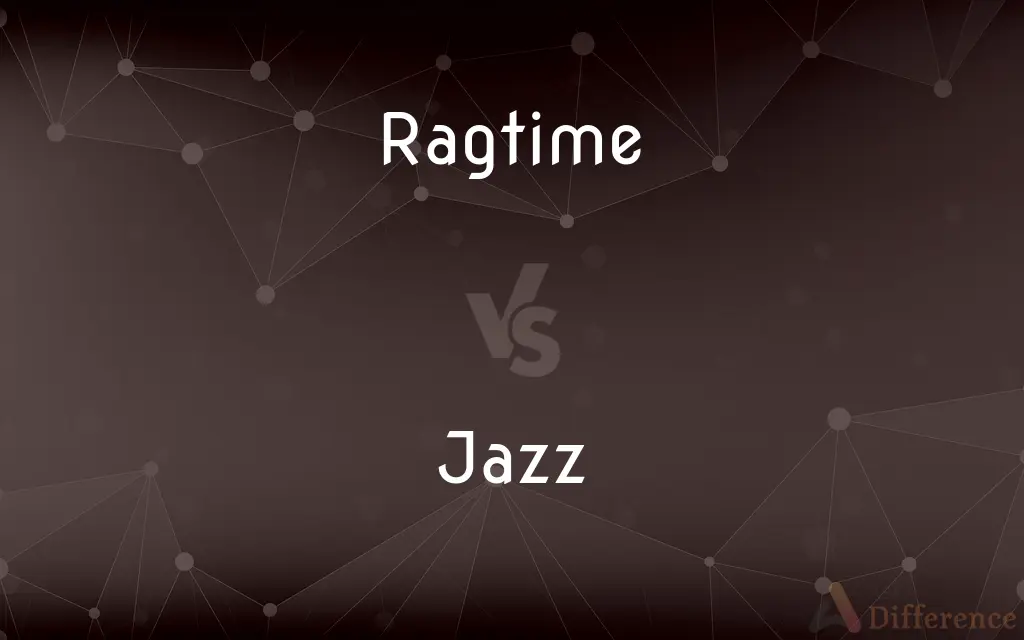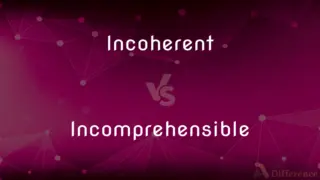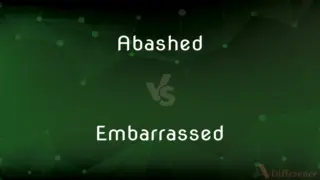Ragtime vs. Jazz — What's the Difference?
By Tayyaba Rehman & Fiza Rafique — Updated on March 28, 2024
Ragtime is a genre with a structured, syncopated rhythm primarily for the piano, originating in the late 19th century, while Jazz is a more improvisational and diverse genre that emerged in the early 20th century.

Difference Between Ragtime and Jazz
Table of Contents
ADVERTISEMENT
Key Differences
Ragtime music, characterized by its syncopated rhythm and regular march tempo, was popular in the late 19th and early 20th centuries. It is primarily composed for solo piano. Whereas, Jazz emerged in the early 20th century, drawing from ragtime, blues, and other music forms, characterized by its swing rhythms, improvisation, and use of various instruments.
Ragtime's structure is more rigid, often composed and played as written, with little room for improvisation. The music's melody is usually played in the right hand, with a steady bass line in the left. On the other hand, Jazz is known for its emphasis on improvisation, creative expression, and complex harmonies. Musicians often play solos, which are improvised on the spot.
The popularity of Ragtime peaked in the early 1900s, with Scott Joplin, known as the "King of Ragtime," leading the genre. Ragtime was a precursor to Jazz, laying the groundwork for the jazz era. Whereas, Jazz saw its major development in the 1920s, known as the Jazz Age, with figures like Louis Armstrong and Duke Ellington.
Ragtime music often evokes a nostalgic, orderly, and somewhat formal atmosphere, reflective of its origins in the saloons and parlors of America. Whereas, Jazz, with its roots in African American musical traditions, encompasses a wider range of emotions and settings, from the intimate to the exuberant, reflecting its diverse origins.
Despite their differences, both Ragtime and Jazz have had a profound impact on the musical landscape, influencing a wide range of music genres. While Ragtime introduced syncopation and a new rhythmic complexity, Jazz expanded on these innovations, introducing improvisation and a new form of musical expression.
ADVERTISEMENT
Comparison Chart
Origin
Late 19th century
Early 20th century
Main Instruments
Primarily piano
Various, including horns, piano, drums
Rhythm
Syncopated, structured
Swing, improvisational
Improvisation
Minimal or none
Central feature
Popular Period
1890s to 1910s
1920s to present
Compare with Definitions
Ragtime
Music primarily for solo piano with a rhythmic left-hand accompaniment.
Ragtime pieces often feature a bouncy rhythm that makes you want to dance.
Jazz
A music genre that originated in the African American communities of New Orleans.
Jazz music is often associated with complex improvisations and variations.
Ragtime
A style marking the transition from classical to jazz music.
Ragtime was a critical stepping stone in the evolution of jazz.
Jazz
Known for its swing rhythms and improvisation.
Jazz musicians express themselves through spontaneous solos.
Ragtime
A musical genre characterized by a syncopated melody and regularly accented accompaniment.
Scott Joplin's 'The Entertainer' is one of the most famous pieces of ragtime music.
Jazz
Encompasses a variety of styles including bebop, swing, and fusion.
The diversity of jazz styles showcases its evolution over the years.
Ragtime
Originating in African American communities in the late 19th century.
Ragtime music reflects the cultural heritage and struggles of African American communities.
Jazz
Emphasizes musical collaboration and interaction.
Jazz concerts often feature extensive improvisational exchanges among musicians.
Ragtime
Known for its structured form and performance.
Ragtime compositions are meticulously crafted, with each note playing a specific role.
Jazz
A reflection of cultural diversity and innovation.
Jazz music has influenced many other genres, demonstrating its wide-reaching impact.
Ragtime
Ragtime – also spelled rag-time or rag time – is a musical style that enjoyed its peak popularity between 1895 and 1919. Its cardinal trait is its syncopated or "ragged" rhythm.
Jazz
Jazz is a music genre that originated in the African-American communities of New Orleans, Louisiana, United States, in the late 19th and early 20th centuries, with its roots in blues and ragtime. Since the 1920s Jazz Age, it has been recognized as a major form of musical expression in traditional and popular music, linked by the common bonds of African-American and European-American musical parentage.
Ragtime
A style of jazz characterized by elaborately syncopated rhythm in the melody and a steadily accented accompaniment.
Jazz
A style of music, native to America, characterized by a strong but flexible rhythmic understructure with solo and ensemble improvisations on basic tunes and chord patterns and, more recently, a highly sophisticated harmonic idiom.
Ragtime
A musical form having a rhythm characterized by strong syncopation in the melody with a regularly accented accompaniment.
Jazz
Big band dance music.
Ragtime
A piece of music in this style.
Jazz
Animation; enthusiasm.
Ragtime
A rhythm with a regular accompaniment in two-four time and a melody characterized by syncopation, first recognized in many negro melodies; also a style of American music in this rhythm.
Jazz
Nonsense.
Ragtime
Music with a syncopated melody (usually for the piano)
Jazz
Miscellaneous, unspecified things
Brought the food and all the jazz to go with it.
Jazz
(Music) To play in a jazz style.
Jazz
To utter exaggerations or lies to
Don't jazz me.
Jazz
To give great pleasure to; excite
The surprise party jazzed the guest of honor.
Jazz
To cause to accelerate.
Jazz
To exaggerate or lie.
Jazz
(music genre) A musical art form rooted in West African cultural and musical expression and in the African American blues tradition, with diverse influences over time, commonly characterized by blue notes, syncopation, swing, call and response, polyrhythms and improvisation.
Jazz
Energy, excitement, excitability.
Jazz
The substance or makeup of a thing.
What jazz were you referring to earlier?
What is all this jazz lying around?
Jazz
Unspecified thing(s).
Jazz
(with positive terms) Something of excellent quality, the genuine article.
Jazz
Nonsense.
Stop talking jazz.
Jazz
Semen, jizz.
Jazz
To destroy.
Jazz
To play (jazz music).
Jazz
To dance to the tunes of jazz music.
Jazz
To enliven, brighten up, make more colourful or exciting; excite
Jazz
To complicate.
Jazz
(intransitive) To move (around/about) in a lively or frivolous manner; to fool around.
Jazz
To distract or pester.
Jazz
To ejaculate.
Jazz
A type of music that originated in New Orleans around 1900 and developed through increasingly complex styles, but generally featuring intricate rhythms, improvisation, prominent solo segments, and great freedom in harmonic idiom played frequently in a polyphonic style, on various instruments including horn, saxophone, piano and percussion, but rarely stringed instruments.
Jazz
Empty or insincere or exaggerated talk; as, don't give me any of that jazz.
Jazz
A style of dance music popular in the 1920s; similar to New Orleans jazz but played by large bands.
Jazz
Empty rhetoric or insincere or exaggerated talk;
That's a lot of wind
Don't give me any of that jazz
Jazz
A genre of popular music that originated in New Orleans around 1900 and developed through increasingly complex styles
Jazz
A style of dance music popular in the 1920s; similar to New Orleans jazz but played by large bands
Jazz
Play something in the style of jazz
Common Curiosities
What is Jazz?
Jazz is a diverse music genre characterized by swing rhythms, improvisation, and a wide range of instruments.
Can Ragtime be considered a form of Jazz?
Ragtime is seen as a precursor to Jazz, introducing elements like syncopation, but it is distinct due to its structured compositions and limited improvisation.
How does Ragtime differ from Jazz?
Ragtime has a more structured, syncopated rhythm and is primarily composed for piano, while Jazz focuses on improvisation and uses a variety of instruments.
What is Ragtime?
Ragtime is a musical genre known for its distinctive syncopated rhythm and structured composition, mainly for solo piano.
Who was a famous Ragtime musician?
Scott Joplin, known as the "King of Ragtime," was a prominent Ragtime musician.
What are some characteristics of Jazz music?
Jazz is known for its improvisation, complex harmonies, and rhythmic flexibility.
Is improvisation a feature of Ragtime music?
Improvisation is minimal or non-existent in Ragtime music, which contrasts sharply with the improvisational nature of Jazz.
When did Ragtime music peak in popularity?
Ragtime music peaked in popularity from the late 1890s to the early 1910s.
How did Ragtime influence Jazz?
Ragtime introduced syncopated rhythms and a focus on melody that laid the groundwork for Jazz's later development.
Who are some iconic Jazz musicians?
Iconic Jazz musicians include Louis Armstrong, Duke Ellington, and Miles Davis, among others.
How does the mood of Ragtime music generally feel?
Ragtime music often feels upbeat, structured, and somewhat formal, reflective of its saloon and parlor origins.
What instruments are typically used in Jazz?
Jazz often includes horns, piano, double bass, and drums, among other instruments.
What role does the piano play in Ragtime?
The piano is the central instrument in Ragtime, with compositions primarily written for solo performance.
What makes Jazz music stand out from other genres?
Jazz stands out due to its emphasis on improvisation, diverse instrument use, and complex harmonies.
How has Jazz evolved over the years?
Jazz has evolved through the incorporation of various musical styles, technologies, and cultural influences, leading to a diverse array of subgenres.
Share Your Discovery

Previous Comparison
Incoherent vs. Incomprehensible
Next Comparison
Abashed vs. EmbarrassedAuthor Spotlight
Written by
Tayyaba RehmanTayyaba Rehman is a distinguished writer, currently serving as a primary contributor to askdifference.com. As a researcher in semantics and etymology, Tayyaba's passion for the complexity of languages and their distinctions has found a perfect home on the platform. Tayyaba delves into the intricacies of language, distinguishing between commonly confused words and phrases, thereby providing clarity for readers worldwide.
Co-written by
Fiza RafiqueFiza Rafique is a skilled content writer at AskDifference.com, where she meticulously refines and enhances written pieces. Drawing from her vast editorial expertise, Fiza ensures clarity, accuracy, and precision in every article. Passionate about language, she continually seeks to elevate the quality of content for readers worldwide.















































